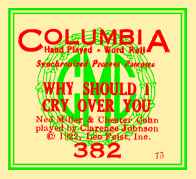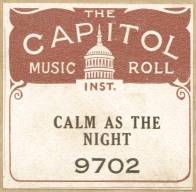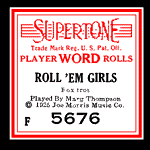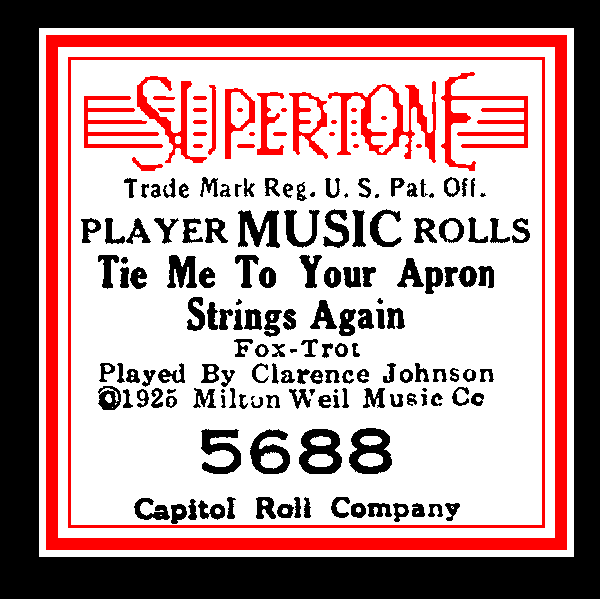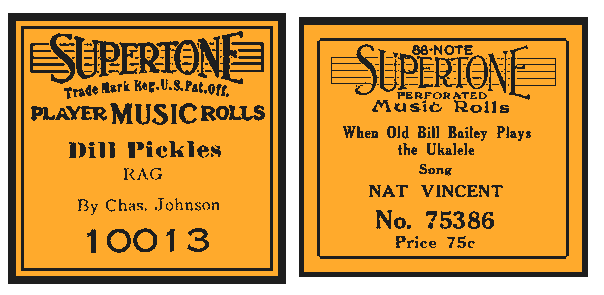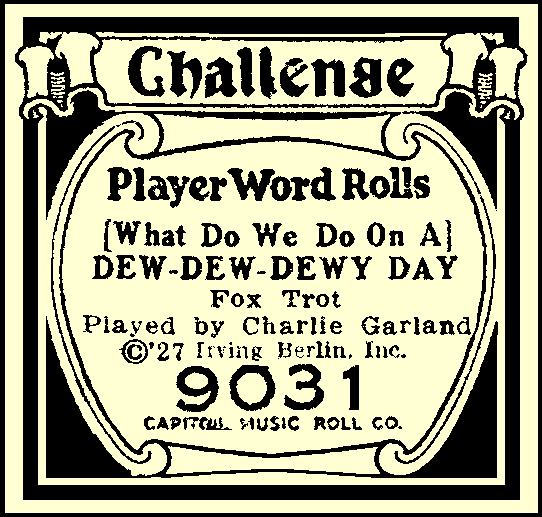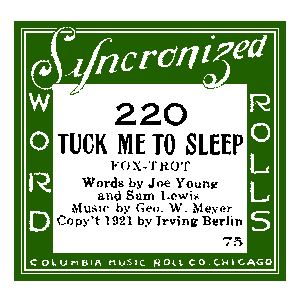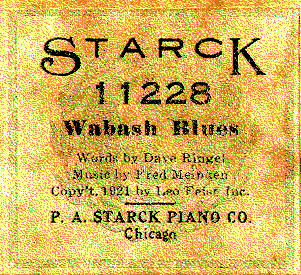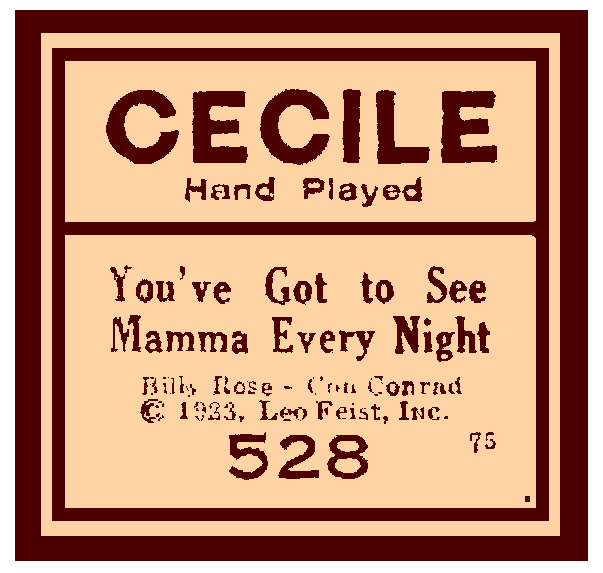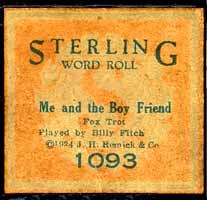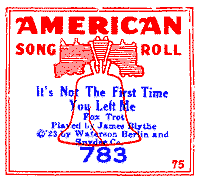| You Are Not Logged In | Login/Get New Account |
|
Please Log In. Accounts are free!
Logged In users are granted additional features including a more current version of the Archives and a simplified process for submitting articles. |
|
MMD
 MMMedia
MMMedia
 CoCap
CoCap
|
|
edited and revised by Robbie Rhodes from data compiled and donated to MMD by Mike Montgomery 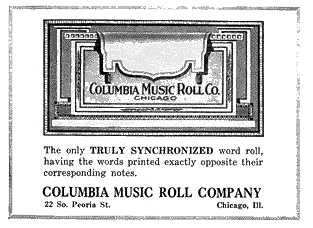 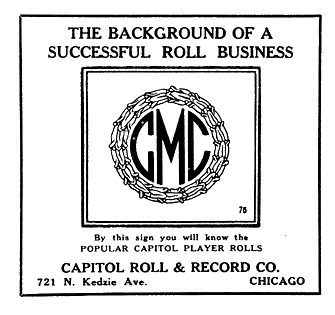 Brand names on the labels of 88-note rolls made by Columbia/Capitol include American, Broadway, Capitol, Cecile, Challenge, Columbia, Red Seal, Starck, Sterling, Supertone, Syncronized. The 88-note performances also supported the equally profitable line of music rolls for coin-operated pianos made by the parent company, Operators, as well as other makes such as Seeburg. Many of the 88-note rolls were also packaged and sold to Sears, Roebuck & Co. for mail-order sales as Sears "Supertone" rolls. In 991022 MMDigest collector Bryan Cather listed the common characteristics of the labels and music rolls, and remarked, "Incidentally, I find the jazz selections to be very good, no doubt drawing on Chicago's sizable jazz community in the 1920s." - Simple, stamped roll label, except Challenge (more elaborate
stamped label), and Starck & Synchronized (paper label like on box).
(Thanks to John Farrell for sending the following information, quoted from the Mike Montgomery data.) COLUMBIA -- The earliest Columbia rolls came out as Columbia brand rolls. They had fairly fancy label designs and glued-on linen leaders for extra strength. Four specimens are known to me to date. A different Columbia label came into use after the firm gave up using the short-lived "Syncronized" brand. CAPITOL -- The Columbia Company changed its corporate name in 1924, and their rolls became Capitol rolls as a result. SUPERTONE -- The Sears Roebuck Company used this name as its own brand for various musical mechandise, including 78 rpm records (which Columbia/Capitol did not make for them) and piano rolls (which Columbia/Capitol did). It is possible that Columbia began making Supertone rolls before they issued rolls on their own label. The Columbia/Capitol relationship with Sears continued from 1920 until the end in 1933. It is not clear whether someone at Sears chose the titles to be made into Supertone rolls or whether Sears left this up to Columbia/Capitol. For a while, in late 1926 and early 1927, a few Supertone rolls were produced by two firms: the Capitol Company in Chicago and the Connorized Music Company in New York. The Connorized issues are always identified as such and issued the same titles and used the same serial numbers as Capitol. Sometimes the master rolls appear to be the same and sometimes they are different. It was probably an experiment to see if having a roll supplier on the East Coast (Connorized) could save Sears some freight costs for filling orders for that part of the country. After all, Supertone rolls retailed sometimes for 49 cents or less, and the shipping could amount to as much as 6 cents a roll. CHALLENGE -- Challenge rolls were made for Sears and were deliberately cheaper than Supertone rolls -- and they were shorter in length and were sold for less. Sears also marketed Challenge brand phonograph records which had nothing to do with the Capitol Company. The records were also cheaply made and contain considerable surface noise. All Challenge rolls are of Capitol origin. SYNCRONIZED -- This was also Columbia's own label. The name meant the words were stenciled on the rolls in perfect sychronization with the music. In time this didn't mean much because most word roll makers had succeeded in getting their rolls produced in a similar "synchronized" way. It is not clear whether rolls were also issued on the Columbia brand at the same time they issued Syncronized rolls. STARCK -- This was no relation to the [John] Stark Publishing Company of St. Louis, MO. P.A. Starck was a piano and player piano maker in Chicago and the firm had retail stores too. They obviously sold Columbia rolls under the store's own brand name for a few months. Along the way, Columbia numbered the Starck issues by preceding their own three-digit number with either a 9, a 6, or an 11. CECILE -- I have seen nothing to explain what this label meant or which firm it was produced for. It may have been a chain store's own brand. At any rate, Cecile rolls made by Columbia were a cheaper line, with shorter performances (fewer verses and choruses) and without words. STERLING -- No information is available to explain this brand. Early Sterling rolls carry four-digit serial numbers beginning with a 6 in front of the Columbia number. The 6 drops off after 6302 and from then on the numbers agree with Columbia and Capitol numbers. RED SEAL -- Only one such roll has surfaced: number 8180, based on Columbia 180. I know nothing else about this brand. BROADWAY -- Another mystery brand which may have been made for The Broadway retail or department store chain. AMERICAN -- Still another mystery brand. One of Columbia's special Ku Klux Klan rolls appeared on a label -- without a serial number -- which simply said "American". And "American" brand 78's were made by Gennett records for the Klan, which used the slogan "100% American". There may have been a connection. Whatever the early connection was, Capitol made American rolls until the very end.
(Shown at approximately actual size. Many images can be seen with greater resolution by right-clicking the mouse for "View Image..." The colors in these images are not very accurate...) Columbia (See the Columbia/Capitol catalog compiled by Mike Montgomery.)
(Style OS roll for Reproduco piano-organ)
Supertone (See the Columbia/Capitol Supertone catalog compiled by Mike Montgomery.)
(Early Supertone, not made by Columbia/Capitol)
Challenge
Syncronized (courtesy Bryan Cather)
Cecile (courtesy Bryan Cather)
Sterling (note the faint circle of flying doves)
Red Seal Broadway American (courtesy Frank Himpsl)
22 January 2000 |
|
|
|
|
|
|
|
|
|
CONTACT FORM: Click HERE to write to the editor, or to post a message about Mechanical Musical Instruments to the MMD Unless otherwise noted, all opinions are those of the individual authors and may not represent those of the editors. Compilation copyright 1995-2026 by Jody Kravitz. Please read our Republication Policy before copying information from or creating links to this web site. Click HERE to contact the webmaster regarding problems with the website. |
|
|
||||||
|
